|
De Poolse dichter en toneelschrijver Adam Asnyk werd geboren op 11 september 1838 in Kalisz. Zie ook alle tags voor Adam Asnyk op dit blog en ook mijn blog van 11 september 2010.
No, nothing happened there between us two
No, nothing happened there between us two.
Confessions none, no secrets to reveal.
No obligations had we to pursue,
But for the springtide fancies so unreal;
But for the fragrances and colors bright
That floated freely in the mirthful air,
But for the singing groves by day or night,
And all the green and fragrant meadows there;
But for the brooks and waterfalls up high
That cheerfully sprinkled every gorge and dell,
But for the clouds and rainbows in the sky,
But for the nature’s of all sweetest spell.
But for the lucid fountains we did share,
Wherefrom our hearts would drink delights so true,
But for the primroses and bindweeds there,
No, nothing happened there between us two.
Vertaald door Jarek Zawadzki
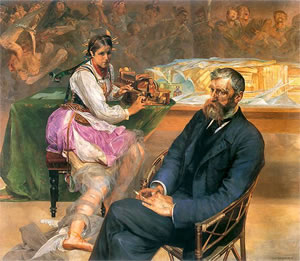
Adam Asnyk (11 september 1838 – 2 augustus 1897)
Adam Asnyk en de muze, geschilderd doorJacek Malczewski
De Schotse dichter en schrijver James Thomson werd geboren op 11 september 1700 in Ednam, Roxburghshire. Zie ook alle tags voor James Thomson op dit blog en ook mijn blog van 11 september 2009 en ook mijn blog van 11 september 2010.
The Four Seasons : Summer (Fragment)
From brightening fields of ether fair disclosed,
Child of the Sun, refulgent Summer comes,
In pride of youth, and felt through Nature's depth:
He comes attended by the sultry Hours,
And ever fanning breezes, on his way;
While, from his ardent look, the turning Spring
Averts her blushful face; and earth, and skies,
All-smiling, to his hot dominion leaves.
Hence, let me haste into the mid-wood shade,
Where scarce a sunbeam wanders through the gloom;
And on the dark-green grass, beside the brink
Of haunted stream, that by the roots of oak
Rolls o'er the rocky channel, lie at large,
And sing the glories of the circling year.
Come, Inspiration! from thy hermit-seat,
By mortal seldom found: may Fancy dare,
From thy fix'd serious eye, and raptured glance
Shot on surrounding Heaven, to steal one look
Creative of the Poet, every power
Exalting to an ecstasy of soul.
And thou, my youthful Muse's early friend,
In whom the human graces all unite:
Pure light of mind, and tenderness of heart;
Genius, and wisdom; the gay social sense,
By decency chastised; goodness and wit,
In seldom-meeting harmony combined;
Unblemish'd honour, and an active zeal
For Britain's glory, liberty, and Man:
O Dodington! attend my rural song,
Stoop to my theme, inspirit every line,
And teach me to deserve thy just applause.
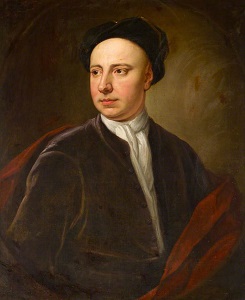
James Thomson (11 september 1700 – 27 augustus 1748)
Portret door Thomas Hudson, 1735
De Ierse dichter Thomas Parnell werd geboren in Dublin op 11 september 1679. Zie ook alle tags voor Thomas Parnell op dit blog en ook mijn blog van 11 september 2009 en eveneens mijn blog van 11 september 2010.
Thou Gaudy Idle world adieu
Thou Gaudy Idle world adieu,
& all thy tinsell Joys;
I lovd thee dearly once tis true,
But since a better choice I knew,
Ive made that better choice.
My wishes mount above the sky
Upon the wings of faith,
My soul shall follow when I dy,
For much I doubt if bodys fly,
What ever Asgill saith.
All things are fickle here below,
How ere above they be,
& If I had not left thee now,
Thy pleasures had left me.
Count but the changes Memory
Which your short time has known,
This is the third King which you see
Upon the English throne.
The Irish who by Williams reign
Were run so much aground,
Do by the Trust (confound it) Gain
three hundred thousand pound.
& My acquaintance wonder not
When you my change discover
Ev'n Methwin has a prayr book bought
'Gainst Rochester comes over.
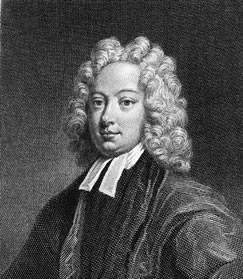
Thomas Parnell (11 september 1679 – 24 oktober 1718)
De Amerikaanse schrijver, journalist en ontdekkingsreiziger Fitz Hugh Ludlow werd geboren op 11 september 1836 in New York. Zie ook alle tags voor Fitz Hugh Ludlow op dit blog en ook mijn blog van 11 september 2010.
Uit: The Hasheesh Eater
“In the hasheesh expansion of seconds into minutes, or even according to a much mightier ratio, there is an opportunity thoroughly to scrutinize the hitherto evanescent phenomena, and the truth comes out. How any more such prophecies as these may have been rejected through the gross habit of the body we may never know until spirit vindicates her claim in a court where she must have audience.
At length the torture of my delirium became so great that I could no longer exist unsustained by sympathy. To Bob, as possessing, from his own experience, a better appreciation of that which I suffered, I repaired in preference to all others. “Let us walk,” said I; “it is impossible for me to remain here.”
Arm-in-arm we passed down the front steps. And now all traces of the surrounding world passed away from before me like marks wiped from a slate. When we first emerged from the building, I noticed that the night was dark, but this was the last I knew of any thing external. I was beyond all troubles from earth or sky; my agonies were in the spiritual, and there all was terrific light. By the flame of my previous vision the corporeal had been entirely burned off from about the soul, and I trod its charred ruins under foot without a remembrance that they had ever been sensitive or part of me. A voice spoke to me, “By the dissolution of fire hast thou been freed, to behold all things as they are, to gaze on realities, to know principles, to understand tendencies of being.”
I now perceived that I was to pass through some awful revelation. It proved to be both Heaven and Hell, the only two states in the universe which together comprehend all free-agent creatures, whether in the Here or the hereafter. Of both I drank tremendous draughts, holding the cup to my lips as may never be done again until the draught of one of them is final.”
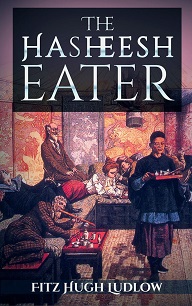
Fitz Hugh Ludlow (11 september 1836 – 12 september 1870)
Cover
De Duitse schrijver Johann Jakob Engel werd geboren op 11 september 1741 in Parchim, Mecklenburg-Schwerin. Zie ook alle tags voor Johann Jakob Engel op dit blog en ook mijn blog van 11 september 2010.
Uit: Herr Lorenz Stark
„Herrn Stark waren von seinen vielen Kindern nur zwei am Leben geblieben: ein Sohn, der sich nach dem Beispiel des Vaters der Handlung gewidmet hatte, und eine Tochter. Letztere war an einen der berühmtesten Aerzte des Orts, Herrn Doctor Herbst, verheirathet: einen Mann, der nicht weniger Geschicklichkeit besaß, Leben hervorzubringen, als zu erhalten. Er hatte das ganze Haus voll Kinder und eben dies machte die Tochter zum Liebling des Alten, der ein großer Kinderfreund war. Weil der Schwiegersohn unfern der Kirche wohnte, die Herr Stark zu besuchen pflegte, so war es ausgemacht, daß er jeden Sonntag bei dem Schwiegersohn aß: und seine Frömmigkeit hätte zuweilen wol gern die Kirche versäumt, wenn nur seine Großvaterliebe den Anblick so werther Enkel und Enkelinnen hätte versäumen können. Es ging ihm immer das Herz auf, wenn ihm der kleine Schwarm, beim Hereintreten in's Haus, mit Jubelgeschrei entgegensprang, sich an seine Hände und Rockschöße hängte, und ihm die kleinen Geschenke abschmeichelte, die er für sie in den Taschen hatte. Unter dem Tischgebete schweiften zuweilen die Augen der Kleinen umher, und er pflegte ihnen dann leise zuzurufen: Andacht! Andacht! aber der gerade am wenigsten Andacht hatte, war er selbst; denn sein ganzes Herz war, wo seine Augen waren, bei seinen Enkeln.
Mit seinem Sohne war dagegen Herr Stark desto unzufriedener. Auf der einen Seite war er ihm zu verschwenderisch, weil er ihm zu viel Geld verkleidete, verritt und verfuhr; insbesondere aber, weil er zu viel auf Kaffeehäuser und in Spielgesellschaften ging. Auf der andern Seite verdroß es Herrn Stark, daß der Sohn als Kaufmann zu wenig Unternehmungsgeist, und als Mensch zu wenig von der Wohlthätigkeit und Großmuth seines eigenen Charakters hatte. Er hielt ihn für ein Mittelding von einem Geizhalse und einem Verschwender; zwei Eigenschaften, die Herr Stark in gleichem Grade verabscheute.“
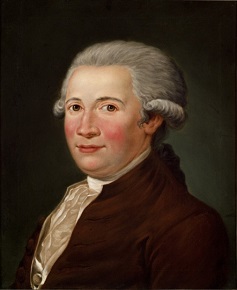
Johann Jakob Engel (11 september 1741 – 28 juni 1802)
Portret door Ferdinand Collmann, 1789
|



